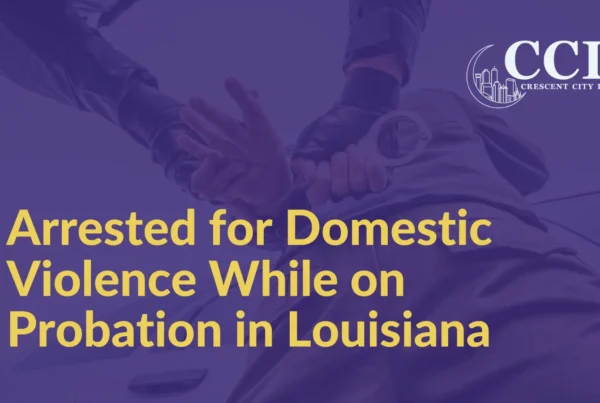Facing domestic abuse battery charges in Louisiana puts your career, reputation, relationships, and emotional health at risk. You may face months or years of jail time, harsh fines, and reputational damage that can follow you for the rest of your life.
If you’ve been charged with domestic abuse battery, it’s hard to know what to do or how to respond.
With the help of our experienced New Orleans domestic violence lawyers at Crescent City Law, you can understand what you’re up against and stand a much better chance of getting your charges dropped or dismissed.
How is domestic abuse battery defined in the state of Louisiana?
According to Louisiana law La R.S. 14:35.3:
“Domestic abuse battery is the intentional use of force or violence committed by one household member or family member upon the person of another household member or family member.”
To break that down, a “household member” can be any person who is now or has been living in the same residence as the accused. They may be currently or previously in a romantic or intimate relationship with the accused, a child currently or previously living with the accused, or any child of the accused, regardless of where the child lived.
A “family member” refers to any of the following:
- current or former spouses,
- parents,
- children,
- stepparents,
- stepchildren,
- foster children,
- foster parents, and. any other ascendents or descendents
“Family member” can also mean the other parent or foster parent of the child or foster child of the accused under Louisiana law.
Domestic abuse laws in Louisiana
Domestic violence laws in Louisiana are frequently updated. Here are some of the most recent bills to be signed into Louisiana law, related to domestic violence:
- Gwen’s Law
Gwen’s Law is named after Gwen Sally, whose husband shot and killed her and himself. He had bonded out of prison for threatening her with a gun, prior to the shooting, even though Gwen had filed a protection order against him. Gwen’s law requires a 72-hour cooling period before someone can be released after an arrest for a domestic violence offense and makes it difficult (but not impossible) for people who were arrested for domestic crimes to be quickly bonded out.
- House Bill 753 (or the Pixie Gouaux Act)
Also named the Susan “Pixie” Gouaux Act, this law resulted from the death of a woman who was shot in a shooting spree that left her and three other people dead.
According to this law, those convicted of misdemeanor domestic abuse:
- Cannot possess a firearm for 10 years
- Face 1-5 years of prison time or $500-$1,000 in fines if they possess a firearm during the 10-year period.
- House Bill 750
This 2014 bill is made up of two major components:
- Louisiana judges must immediately send a copy of any protective orders they’ve issued to clerks of the courts. The clerks then process the orders into the Louisiana Protective Order Registry.
- Law enforcement must arrest any person who violates their protective orders. This means that an individual with an active protective order open who is involved in a new domestic violence call will automatically be assumed to be an aggressor.
- Special Bond Conditions for people accused of domestic violence.
When someone is arrested for domestic violence or an offense where domestic violence is an element of the offese, the court may impose the following special conditions on the accused:
- Prohibit the possession of a firearm and surrender any firearm in the house to the court.
- The accused may be required to participate in a court ordered domestic violence monitoring and prevention program.
- The accused may be required to wear an ankle monitor to track their location.
- The victim may be provided with a panic button or bracelet, which sends an alert to law enforcement if the accused violates the protective order (sometimes called a domestic violence restrain order or “stay away order”).
Penalties for domestic abuse battery in Louisiana
Domestic abuse battery is a serious charge that can have lifelong repercussions.
The extent of your penalties depends on a number of factors, including how many offenses you’ve already been charged for, the nature of the violence, your relationship to the victim, whether or not you used a gun, and other details.
First offense domestic abuse battery penalties
If this is your first offense of domestic abuse battery in Louisiana, you can face:
- 30 days to 6-months of imprisonment, or up to 2-years of probation. The first 48 hours of any sentence must be served in jail.
- $300-$1,000 in fines
- Court-approved community service activities
- Court-monitored domestic abuse intervention programs.
Second offense domestic abuse battery penalties
If you are convicted a second time for domestic abuse battery in Louisiana, you may face:
- 60 days to 1-year of imprisonment, or up to 2 years of probation. The first 14-days of you sentence must be served in jail.
- $750-$1,000 in fines
- Court-monitored domestic abuse prevention programs
- 30+ days of court-ordered community service
Third offense domestic abuse battery penalties
Here are the penalties for your third offense of domestic abuse battery:
- A felony conviction which carries 1-5 years of imprisonment at hard labor, or up to 3 years of probation. The first year of any sentence you receive must be served in prison.
- A $2,000 fine.
Fourth offense domestic abuse battery penalties
Finally, if this is your fourth time being charged with domestic abuse violence in Louisiana, you may face:
- A felony 10-30 years of imprisonment.
- You are subject to increased penalties as a multiple felony offender of 15-60 years in prison. If you are convicted as a multiple offender, you are not eligible for probation.
- The first 3-years of any sentence must be served in prison.
- A $5,000 fine.
Contact a Defense Lawyer at Crescent City Law
If you or someone you know is facing domestic violence charges in Louisiana, contacting an experienced defense attorney should be your first step. With the right defense, you might be able to have your charges reduced or dismissed. At Crescent City Law, we are determined to serve as your advocates and guides to pursue the best outcome possible for you or your loved one. Contact our team today to schedule a consultation.






